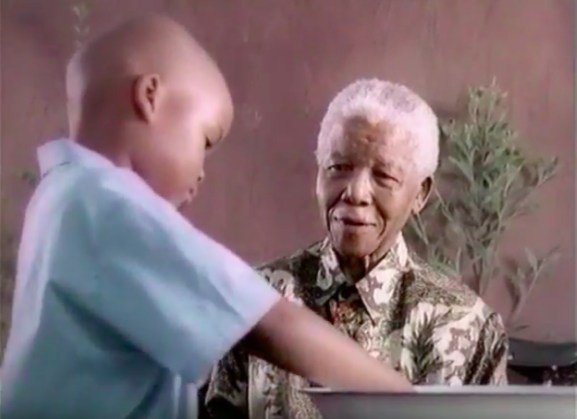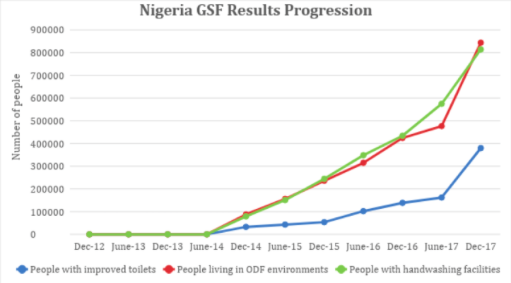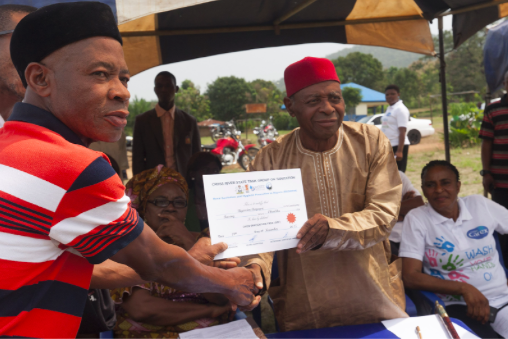It is fitting that Global Citizen takes time out to present our accountability findings for our commitments contributing toward an open defecation free world during the Year of Mandela — 2018 being the year the former President of South Africa would have turned 100 years old.
Nelson Mandela was famous not only for his integrity as a leader in the effort to end apartheid, but also in the fight to end extreme poverty, which he identified as man-made problem that could therefore be eradicated by the actions of humans. Speaking on the issue in July 1996, he said, “The children who sleep in the streets, reduced to begging to make a living, are a testimony to an unfinished job. The families who live in shacks with no running water, sanitation and electricity are a reminder that the past continues to haunt the present.”

This dedication and passion led Nelson Mandela to become a champion of clean water, good hygiene, and sanitation. He spoke on water, sanitation and hygiene-related issues on many occasions, and even filmed an educational public service announcement for WSSCC, raising awareness about the issue.
South Africa, however, and many other countries have yet to be certified Open Defecation Free, meaning that five years after the death of this great hero, “The past continues to haunt the present."
Take Action: Ensure All South Africa’s Children Grow Great
Poor and unsafe sanitation is indeed haunting the world, including South Africa, with tragic consequences.
In July 2018, a three year-old boy named Omari Monono became the latest child to drown in an open pit latrine, while in the care of his aunt. The accident was not isolated, occuring in the same region of South Africa as the death of 5-year-old Michael Komape who died in a school pit latrine in 2014. And earlier this year in March, five year-old Lumka Mketwa also died in a pit toilet at a primary school in the Eastern Cape.
Ending open defecation is the first step on the path to achieving safe and total sanitation, which is defined by UNICEF as “zero open defecation and 100% of excreta hygienically contained.” If this is achieved, death by preventable communicable disease will fall sharply, and we can put an end to these tragic, undignified deaths casued purely by inadequate infrastructure.
Shockingly, despite these horrific child deaths, a R3.5 billion fund for accelerated school infrastructure, intended to support maintenance issues such as dangerous pit latrines, has been targeted for planned cuts over the next three years, according to News 24. That’s why we look forward to leveraging the Year of Mandela Campaign, and our largest ever event to be held in Johannesburg on 2 December 2018 — Global Citizen Festival: Mandela 100 to further promote access to sanitation in South Africa, as well as across the African Union and around the world.
Since 2014, Global Citizen has been an active driver for change to see a certified Open Defecation Free world. We’ve secured 12 commitments specifically working in this space, alongside other complementary commitments working toward Global Goal 6. This latest report follows up on the progress of those 12 commitments. These are valued at $15.8 billion and are set to affect more than 538 million lives.
Our accountability tracking and reporting efforts reveal that as of July 2018, these 12 commitments have seen $12.1 billion disbursed toward various ODF and WASH initiatives, with 313.6 million lives impacted to date.
Of the 12 ODF commitments tracked in this WASH update accountability report, one is complete and exceeded, nine are in progress and on-track, one is in progress but off-track, and one is too soon to tell. Compared with our previous reporting on these commitments, the status of progress for six items has improved, six have remained the same, and none have declined.
This accountability report forms part of our efforts to hold commitment makers accountable for their promises toward ending water and sanitation poverty, and across the issues we regularly campaign for, including education, health, food and hunger, girls and women, and the environment, as well as broader campaigning for official development assistance, and supporting innovative finance solutions. Global Citizens interested in this report may also enjoy our recent Global Citizen Festival India 2.0 report, released in June, which features a number of progress reports on water and sanitation related commitments.
At Global Citizen, we believe that our campaigning and advocacy efforts are nothing if they are not driving meaningful and transformational impact to real people in the places where commitments are being delivered. As a result, with the great help of our partners, such as WSSCC, and commitment partners like the World Bank and Sesame Workshop, we try to track the human stories that reveal the true impact of our combined efforts.
Our report includes a focus on Nigeria, which has moved from progressing with some risk to being on track to meet their commitment to become ODF by 2025 since our last report. The diagram shows the progress in Nigeria over time.

Here is the story of Obanliku, a Local Government Area to be certified Open Defecation Free, which has set the model for community leadership as ODF initiatives scale up across the country.
Celebrating success and looking ahead in Obanliku, Nigeria’s Cross River State
Obankliku Local Government Area recently celebrated 128 communities, equating to 17,140 people certified Open Defecation Free by the State Task Group on Sanitation, according to national criteria in November 2015.
Robert Kanung, a natural leader from Busi Ward, shared, “Today is a glorious day. I’m so happy! From nowhere ODF has come to stay in Obanliku, it has come to stay in Busi. Before this programme came, irrespective of our level of education, we were eating our shit in ignorance; we were drinking our shit in ignorance.
We spent plenty money for hospital. Just two weeks ago I did an assessment; I did research into two clinics in my ward. I asked the officers there to give me the records of diarrhoea cases they had there in 2014 and then the records for 2015. Last year, before this programme started, they had 48 cases which they treated, and I asked about the kind of treatment they used and drugs they gave.
That whole community alone spent 117,000 Naira in 2014. But this year they had just seven cases, and the whole money they spent was just 12,000 Naira. All of the money that was spent that time, you can see it went back to maybe paying children’s school fees, maybe changing our diet as well and changing one or two things in the house. This is a programme to be handled with all seriousness. Wherever it touches, people should queue in immediately because there are a lot of advantages. They find good health, fresh good air, even crops in the backyard. They should make sure to join the wagon.
These efforts were supported by the Rural Sanitation and Hygiene Promotion in Nigeria, known as RUSHPIN, a government initiative funded by WSSCC’s Global Sanitation Fund, with Concern Universal the executing agency. Work began in June 2014, with an MOU ensuring that Government of Nigeria, the Cross River and Benue State Governments and WSSCC would match Global Sanitation Fund’s investment, to double the number of local government authorities included in the RUSHPIN program.
Obanliku has been branded as best performing owing to the community-led total sanitation approach, a series of joint efforts by multiple actors with strong leadership from the Paramount Ruler of Obankliku, His Royal Majesty Cyprien Ashang - which ensured strong buy-in from local chiefs, who in turn supported “natural leaders” emerging from local communities.

The Paramount Leader awarded the ODF certificate, emphasizing the need to keep Obanliku ODF, saying, “Don’t get good and get bad again! I’ll hold my village head and my clan heads responsible if you get bad. I will drop by your villages, I’ll be going through you backyards, and if I find anything bad, I will not report you to Calabar [capital of Cross River State where the GSF Executing Agency is located], I will call you to my own office. So, be very careful! Today you have been certified as a good person or a good community. But remember that someone is watching you. And who is that? The Paramount Ruler!”
Alongside strong community leadership, collaboration has been a critical aspect of success. The combination of local WASH clinics, continual follow-up community visits by the Local Task Group on Sanitation has proven effective. Tailored to each community’s needs, the WASH clinics are gatherings for political, traditional and natural leaders from triggered communities to come together with local government officials from Obanliku and Concern Universal as the executing agency to review progress, and share lessons from high performing communities and plan effective support for those lagging behind. Local WASHCOMs were also formed in communities, whose members are trained to assist and advise other community members in the construction of latrines and improvements in sanitation and hygiene, a notable feature of Obanliku’s ODF success.
As this accountability report went to press in July 2018, Global Citizen was informed that Bekwarra Local Government Area of Cross River State was declared Open Defecation Free in April 2018, by way of a Press Release by the State government. This is the second LGA to be declared open defecation free in the GSF-supported Rural Sanitation and Hygiene Promotion in Nigeria (RUSHPIN) programme.